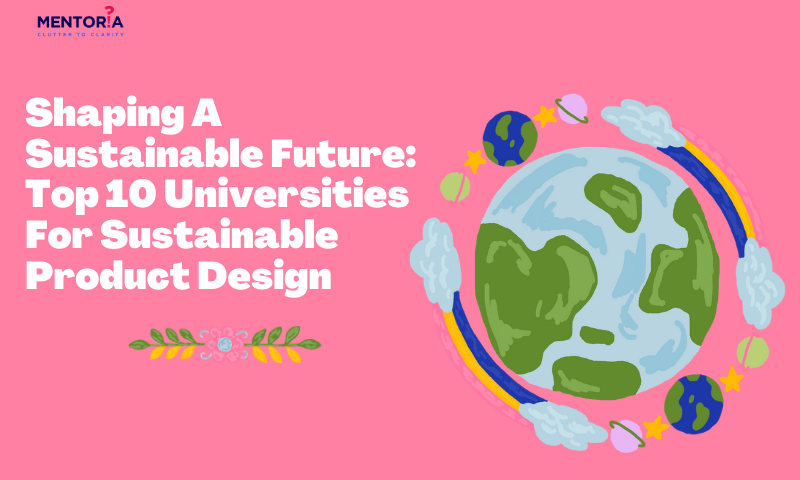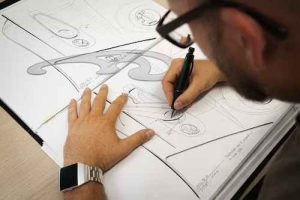Shaping A Sustainable Future: Top 10 Universities For Sustainable Product Design

Jump to Section
Welcome to the exciting world of sustainable product design! Are you passionate about creating innovative and environmentally-friendly products that make a positive impact on the world? Look no further. In this blog, we will take you on a journey to explore the top 10 universities and institutions offering courses for sustainable product design in India and abroad. Get ready to dive into a world of creativity, sustainability, and cutting-edge design principles. Whether you’re an aspiring student or a design enthusiast, this blog will provide you with valuable insights into the best educational institutions that can shape your career as a sustainable product designer.
Institutions Offering Courses For Sustainable Product Designers
National Institute Of Design (NID), India
NID, located in India, is a premier institution offering courses in sustainable product design. The Bachelor’s and Master’s programs in Product Design at NID are designed to develop students’ skills in sustainable design practices. Through hands-on projects, workshops, and industry collaborations, NID equips students with the knowledge and tools to create environmentally-friendly products. The institution has a strong focus on research and innovation in sustainable design. With a tuition fee of approximately INR 2,50,000 per year for the Bachelor’s program and INR 3,00,000 per year for the Master’s program, NID offers an affordable and comprehensive education in sustainable product design.
- Ranking and Accreditation: NID is one of the premier design institutes in India and is recognized internationally for its design programs. It is accredited by the Ministry of Commerce and Industry, Government of India.
- Intake: NID has a competitive admission process, and the intake varies each year based on the number of available seats.
- Challenges: Some challenges faced by NID students include the rigorous curriculum, time management, and the need to think creatively and innovatively.
- Benefits: NID offers a comprehensive design education, exposure to industry professionals, access to state-of-the-art facilities, and a strong alumni network.
Rhode Island School Of Design (RISD), USA
RISD, located in the United States, is renowned for its Bachelor of Fine Arts (BFA) program in Industrial Design. The program offers a concentration in Sustainable Design, which equips students with the skills and knowledge to create products that are environmentally responsible. RISD emphasises interdisciplinary approaches, allowing students to explore the intersection of design, sustainability, and social impact. With a tuition fee of approximately INR 34,00,000 per year for international students, RISD provides a world-class education in sustainable product design.
- Ranking and Accreditation: RISD is consistently ranked among the top art and design schools globally. It is accredited by the New England Commission of Higher Education.
- Intake: RISD has a competitive admission process, and the intake varies each year based on the number of available seats.
- Challenges: Some challenges faced by RISD students include intense competition, demanding coursework, and the need to develop a unique artistic voice.
- Benefits: RISD offers a diverse and vibrant creative community, renowned faculty, access to world-class facilities, and numerous exhibition opportunities.
Royal College Of Art (RCA), UK
RCA, situated in the United Kingdom, offers a Master’s program in Design Products with a specialisation in Sustainable Design. The program at RCA focuses on integrating sustainable design principles into the entire product lifecycle. Students engage in research, experimentation, and critical thinking to develop innovative solutions that address environmental challenges. The RCA program encourages collaboration with industry partners and emphasises real-world applications of sustainable product design. The tuition fee for international students is approximately INR 37,00,000 per year, reflecting the high-quality education and resources provided by the institution.
- Ranking and Accreditation: RCA is one of the world’s leading art and design institutions, known for its excellence in design education. It is accredited by the Privy Council and the Office for Students in the UK.
- Intake: RCA has a competitive admission process, and the intake varies each year based on the number of available seats.
- Challenges: Some challenges faced by RCA students include the high level of competition, intensive workload, and the need to push boundaries in design.
- Benefits: RCA offers a highly esteemed faculty, access to cutting-edge facilities and resources, opportunities for interdisciplinary collaboration, and strong industry connections.
Delft University Of Technology, Netherlands
Delft University, located in the Netherlands, offers a Master’s program in Integrated Product Design with a specialisation in sustainability and circular design. The program equips students with a deep understanding of sustainable design principles, life cycle assessment, and product innovation. Through a combination of theoretical coursework and practical projects, students learn to create products that minimise environmental impact and contribute to a circular economy. Delft University has a strong research focus, providing students with opportunities to work on cutting-edge sustainable design projects. The tuition fee for international students is approximately INR 22,00,000 per year, reflecting the quality of education and research facilities available at the university.
- Ranking and Accreditation: Delft University of Technology is consistently ranked among the top technical universities globally. It is accredited by the Dutch Ministry of Education, Culture and Science.
- Intake: Delft University has a selective admission process, and the intake varies each year based on the number of available seats.
- Challenges: Some challenges faced by Delft students include the rigorous academic curriculum, time management, and the need for innovative problem-solving skills.
- Benefits: Delft University offers a strong focus on research and innovation, state-of-the-art facilities, interdisciplinary collaborations, and a vibrant student community.
Politecnico Di Milano, Italy
Politecnico di Milano, located in Italy, offers a Master’s program in Product-Service System Design with a strong emphasis on sustainability. The program explores the integration of sustainability principles into product design, considering the entire lifecycle of a product. Students learn about eco-design, circular economy models, and user-centred design approaches. The program encourages interdisciplinary collaboration and provides opportunities to work on real-world projects with industry partners. With a tuition fee of approximately INR 16,00,000 per year for international students, Politecnico di Milano offers a comprehensive education in sustainable product design in a vibrant and innovative setting.
- Ranking and Accreditation: Politecnico di Milano is one of the top technical universities in Italy and is internationally recognized for its design programs. It is accredited by the Italian Ministry of Education, Universities, and Research.
- Intake: Politecnico di Milano has a competitive admission process, and the intake varies each year based on the number of available seats.
- Challenges: Some challenges faced by Politecnico di Milano students include the demanding coursework, time management, and the need to balance theory and practical application.
- Benefits: Politecnico di Milano offers a rich design heritage, renowned faculty, access to modern labs and workshops, industry collaborations, and international exposure.
Lund University, Sweden
Lund University, situated in Sweden, offers a Master’s program in Industrial Design with a specific focus on sustainable product design. The program combines design thinking methodologies, sustainability principles, and entrepreneurship. Students develop skills in product innovation, material selection, and design strategies that promote environmental and social sustainability. Lund University emphasises hands-on learning, allowing students to work on real-world design challenges. With a tuition fee of approximately INR 15,00,000 per year for international students, Lund University provides a supportive and inclusive environment for students interested in sustainable product design.
- Ranking and Accreditation: Lund University is one of the top-ranked universities in Sweden and is known for its interdisciplinary approach to education. It is accredited by the Swedish Higher Education Authority.
- Intake: Lund University has a competitive admission process, and the intake varies each year based on the number of available seats.
- Challenges: Some challenges faced by Lund University students include adapting to a new cultural environment, managing workload, and collaborating with diverse peers.
- Benefits: Lund University offers a strong emphasis on sustainability, a supportive learning environment, access to cutting-edge facilities, and opportunities for international exposure.
Fashion Institute Of Technology (FIT), US
FIT, located in the United States, offers a Bachelor of Fine Arts (BFA) program in Product Design with a concentration in Sustainable Design. The program focuses on the integration of sustainable practices into product development, considering factors such as materials, manufacturing processes, and social responsibility. FIT provides students with opportunities to collaborate with industry partners and gain practical experience through internships and projects. The tuition fee for international students is approximately INR 26,00,000 per year, offering a comprehensive education in sustainable product design within a vibrant fashion and design community.
- Ranking and Accreditation: FIT is a renowned institution in the field of fashion education and is part of the State University of New York (SUNY) system. It is accredited by the Middle States Commission on Higher Education.
- Intake: FIT has a competitive admission process, and the intake varies each year based on the number of available seats.
- Challenges: Some challenges faced by FIT students include the fast-paced nature of the fashion industry, creative competition, and the need to stay updated with evolving trends.
- Benefits: FIT offers a strong industry connection, access to state-of-the-art facilities and resources, internship opportunities, and exposure to the vibrant fashion scene in New York City.
Aalto University, Finland
Aalto University, situated in Finland, offers a Master’s program in Collaborative and Industrial Design with a specialisation in Sustainable Design. The program aims to develop students’ skills in sustainable product development, circular design, and user-centred design approaches. Aalto University emphasises multidisciplinary collaboration and provides opportunities to work on real-world projects with industry partners. The program fosters creativity, critical thinking, and innovation in sustainable design. With a tuition fee of approximately INR 14,00,000 per year for international students, Aalto University offers an immersive learning experience in sustainable product design.
- Ranking and Accreditation: Aalto University is a leading multidisciplinary university in Finland, known for its focus on design and technology. It is accredited by the Finnish Education Evaluation Centre.
- Intake: Aalto University has a competitive admission process, and the intake varies each year based on the number of available seats.
- Challenges: Some challenges faced by Aalto University students include the rigorous academic curriculum, adapting to a new cultural environment, and the need for innovative and sustainable design solutions.
- Benefits: Aalto University offers a strong emphasis on design thinking, collaboration with industry partners, access to cutting-edge facilities and resources, and a vibrant design community.
Queensland University Of Technology (QUT), Australia
QUT, located in Australia, offers a Bachelor’s program in Industrial Design with a focus on sustainable design practices. The program equips students with skills in sustainable materials, manufacturing processes, and design thinking. QUT emphasises hands-on learning and encourages students to develop innovative and environmentally responsible design solutions. With a tuition fee of approximately INR 20,00,000 per year for international students, QUT provides a supportive and collaborative environment for students interested in sustainable product design.
- Ranking and Accreditation: QUT is a prestigious institution in Australia, known for its focus on creative industries and design. It is accredited by the Tertiary Education Quality and Standards Agency (TEQSA).
- Intake: QUT has a competitive admission process, and the intake varies each year based on the number of available seats.
- Challenges: Some challenges faced by QUT students include managing the workload of practical projects, adapting to industry standards, and effectively integrating sustainability principles.
- Benefits: QUT offers strong industry connections, access to state-of-the-art design facilities, collaborative learning opportunities, and exposure to the vibrant creative scene in Brisbane.
Indian School of Design And Innovation (ISDI), India
ISDI, situated in India, offers a Bachelor’s program in Product Design with a specialisation in Sustainable Design. The program focuses on imparting knowledge and skills in sustainable design practices, material exploration, and design thinking. ISDI emphasises industry collaborations, providing students with opportunities to work on real-world projects and gain practical experience. The tuition fee for the program is approximately INR 7,00,000 per year, making ISDI an accessible choice for students interested in sustainable product design in India.
- Ranking and Accreditation: ISDI is a leading design institution in India, known for its innovative and industry-oriented approach to design education. It is affiliated with the Parsons School of Design in New York.
- Intake: ISDI has a competitive admission process, and the intake varies each year based on the number of available seats.
- Challenges: Some challenges faced by ISDI students include adapting to a fast-paced curriculum, managing project deadlines, and developing a unique design voice.
- Benefits: ISDI offers a curriculum aligned with industry needs, access to experienced faculty and industry professionals, industry collaborations, and exposure to international design standards.
Future Scope Of Sustainable Product Designer Field
Job Opportunities
- Sustainable Product Designer: You can work as a sustainable product designer in industries such as fashion, furniture, consumer electronics, and more, focusing on creating eco-friendly and ethical products.
- Sustainable Materials Specialist: With expertise in sustainable materials, you can work with companies to identify and integrate environmentally friendly materials into their product designs.
- Design Consultant: As a design consultant, you can offer your expertise in sustainable product design to various organisations, helping them adopt sustainable practices and develop sustainable product lines.
- Sustainability Manager: In this role, you can work within companies to develop and implement sustainable strategies and initiatives, ensuring that products are designed and manufactured with minimal environmental impact.
- Research and Development: There are opportunities to work in research and development departments, exploring new technologies and materials to create innovative and sustainable product solutions.
Entrepreneurship Opportunities
- Start your own sustainable product design business: You can establish your own design studio or consultancy, offering sustainable design services to clients who prioritise environmental responsibility.
- Create an eco-friendly product line: Develop your own line of sustainable products, catering to conscious consumers who seek environmentally friendly alternatives.
- Collaborate with artisans and craftsmen: Partner with local artisans and craftsmen to create sustainable products that preserve traditional craftsmanship while incorporating modern design principles.
Specialisation And Innovation
- Sustainable Packaging Design: Specialise in designing eco-friendly and recyclable packaging solutions, addressing the environmental impact of product packaging.
- Circular Economy Design: Focus on creating products that follow the principles of the circular economy, promoting reuse, recycling, and minimal waste generation.
- Biomimicry Design: Explore nature-inspired design solutions, learning from natural systems and processes to create sustainable and efficient products.
- Ethical Fashion Design: Specialise in sustainable fashion design, incorporating eco-friendly materials, fair trade practices, and ethical supply chains.
- Product Life Cycle Assessment: Become an expert in analysing and optimising the environmental impact of products throughout their lifecycle, from sourcing to disposal.
International Opportunities
- Work for global sustainability-focused organisations: Many international organisations, such as NGOs, research institutions, and international corporations, are actively seeking sustainable product designers to contribute to their sustainable development initiatives.
- Collaborate with international designers: Build connections with designers and professionals from around the world through conferences, workshops, and online communities, fostering cross-cultural collaborations and knowledge exchange.
The scope of the Sustainable Product Designer field is expanding rapidly as more companies and consumers prioritise sustainability. According to the Bureau of Labor Statistics, the employment of industrial designers, which includes sustainable product designers, is projected to grow by 4% from 2020 to 2030. The demand for professionals who can design environmentally friendly products, reduce waste, and incorporate sustainable practices is expected to drive this growth. With a focus on innovation, creativity, and sustainability, the field of Sustainable Product Design offers diverse career paths and opportunities to make a positive impact on the planet.
Payscale At Various Levels
The payscale for Sustainable Product Designers in India can vary based on factors such as experience, expertise, location, and the size of the organisation. Here are some approximate salary ranges at various levels:
- Entry-level: As a fresh graduate or entry-level Sustainable Product Designer in India, you can expect a salary ranging from INR 3,00,000 to INR 6,00,000 per year. Starting salaries may vary depending on the organisation and the specific role.
- Mid-level: With a few years of experience, the salary range for mid-level Sustainable Product Designers in India typically falls between INR 6,00,000 and INR 12,00,000 per year. At this stage, you may have more responsibilities and the opportunity to work on complex projects.
- Senior-level: As a senior Sustainable Product Designer with considerable experience and expertise, you can earn a salary ranging from INR 12,00,000 to INR 20,00,000 per year or more. Senior-level designers often lead teams, handle high-profile projects, and contribute strategic insights to organisations.
It’s important to note that these salary ranges are approximate and can vary based on factors such as the company’s size, location, industry, and your individual skills and achievements. Additionally, sustainable design professionals may also have the opportunity to earn additional income through freelance work, consulting projects, or by starting their own sustainable product design ventures.
Which Countries Have Growth Perspectives?
India
In India, the sustainable product design industry is experiencing significant growth and opportunities. With the country’s focus on sustainability and environmental conservation, there is a rising demand for skilled Sustainable Product Designers. Companies and organisations are actively seeking professionals who can design and develop sustainable products that minimise environmental impact. The payscale for Sustainable Product Designers in India is influenced by factors such as experience, location, and the organisation’s size. Entry-level designers can expect competitive salaries, and as they gain expertise and experience, their earning potential increases. Entry-level designers can expect a salary range of INR 3,00,000 to INR 6,00,000 per year, while mid-level designers earn around INR 6,00,000 to INR 12,00,000 per year. Senior-level designers with extensive experience can earn INR 12,00,000 or more annually.
United States
The United States is at the forefront of sustainable design practices, and the demand for Sustainable Product Designers is thriving. The country has a robust market for sustainable products, with consumers increasingly prioritising eco-friendly choices. As a Sustainable Product Designer in the US, you can find numerous job opportunities in industries such as fashion, consumer goods, and technology. The payscale for Sustainable Product Designers in the US reflects the industry’s growth and demand, providing competitive salaries and room for career advancement. Entry-level salaries start around INR 12,00,000 per year, while mid-level designers earn approximately INR 18,00,000 to INR 30,00,000 per year. Senior-level designers can earn INR 30,00,000 or more annually.
United Kingdom
The United Kingdom has a strong emphasis on sustainability and is home to renowned institutions and organisations promoting sustainable product design. As a Sustainable Product Designer in the UK, you can work on projects that prioritise environmental considerations and ethical practices. The payscale for Sustainable Product Designers in the UK is aligned with the country’s high living standards and reflects the industry’s importance in driving sustainable change. There are opportunities to collaborate with leading brands and contribute to sustainable innovation in various sectors. Entry-level salaries range from INR 10,00,000 to INR 16,00,000 per year, while mid-level designers earn around INR 18,00,000 to INR 24,00,000 per year. Senior-level designers can earn INR 24,00,000 or more annually.
Germany
Germany is widely recognized for its commitment to sustainability and environmental stewardship. The country offers excellent prospects for Sustainable Product Designers, with a focus on creating innovative and eco-friendly products. German companies are at the forefront of sustainable design, and as a designer in this field, you can contribute to cutting-edge projects that address global challenges. The payscale for Sustainable Product Designers in Germany is competitive, reflecting the country’s strong economy and dedication to sustainability. Entry-level salaries start around INR 12,00,000 per year, while mid-level designers earn approximately INR 18,00,000 to INR 30,00,000 per year. Senior-level designers can earn INR 30,00,000 or more annually.
Canada
Canada has a growing demand for Sustainable Product Designers, driven by the country’s emphasis on sustainable development and responsible consumption. Canadian companies are increasingly incorporating sustainable practices into their product design and manufacturing processes. As a Sustainable Product Designer in Canada, you can work on diverse projects, ranging from sustainable fashion to eco-friendly packaging solutions. The payscale for Sustainable Product Designers in Canada is attractive, providing professionals with rewarding career opportunities and competitive compensation. Entry-level salaries range from INR 12,00,000 to INR 16,00,000 per year, while mid-level designers earn around INR 18,00,000 to INR 24,00,000 per year. Senior-level designers can earn INR 24,00,000 or more annually.
How Is Technology And AI Impacting The Sustainable Product Designer Field?
Design Tools And Software
Technology and AI have revolutionised the design process for Sustainable Product Designers. Advanced design tools and software, such as computer-aided design (CAD), allow designers to create intricate and sustainable product designs with precision and efficiency. These tools provide features like virtual prototyping, simulation, and optimization, enabling designers to test and refine their designs for maximum sustainability. By leveraging these tools, designers can reduce product development time, minimise waste, and improve the overall sustainability of their designs.
Material Innovation
Technology and AI are driving material innovation in the field of sustainable product design. Through AI algorithms and machine learning, researchers are discovering and developing new materials that are eco-friendly, biodegradable, and sourced sustainably. These materials offer improved performance and reduced environmental impact, making them ideal for sustainable product design. By staying updated with the latest material innovations, Sustainable Product Designers can select and incorporate these eco-friendly materials into their designs, contributing to a more sustainable and responsible product ecosystem.
Life Cycle Analysis
Technology and AI play a crucial role in conducting comprehensive life cycle analysis for sustainable product design. By utilising AI algorithms and data analytics, designers can assess the environmental impact of a product throughout its entire lifecycle, from raw material extraction to disposal. This analysis helps identify areas of improvement and allows designers to make informed decisions regarding material choices, manufacturing processes, and packaging design. By considering the complete lifecycle, designers can create products that minimise environmental harm, optimise resource use, and promote circular economy principles.
Smart And Connected Products
The rise of the Internet of Things (IoT) has opened up new opportunities for sustainable product design. IoT-enabled devices and connected products allow for real-time data collection and analysis, enabling Sustainable Product Designers to monitor and optimise the energy consumption, performance, and user experience of their products. By incorporating IoT technologies, designers can create products that are energy-efficient, responsive to user needs, and capable of adapting to changing environmental conditions. These smart and connected products promote sustainable behaviours and provide users with actionable insights for reducing their environmental footprint.
Sustainable Manufacturing Technologies
Technology and AI have transformed manufacturing processes, making them more sustainable and eco-friendly. Additive manufacturing, commonly known as 3D printing, is one such technology that offers numerous sustainability benefits. It enables precise and localised production, reducing material waste and transportation-related emissions. Sustainable Product Designers can leverage 3D printing and other sustainable manufacturing technologies to optimise material usage, minimise waste, and create products that align with circular economy principles. These technologies empower designers to make significant contributions to sustainable manufacturing practices and reduce the environmental impact of the production process.
Become An Sustainable Product Designer With Mentoria!
You’ve discovered the top 10 universities and institutions offering courses for sustainable product design in India and abroad. From NID in India to renowned institutions like RISD, RCA, and Delft University, these programs provide an immersive learning experience to nurture your creativity and passion for sustainable design. Remember, sustainable product design is not just a career choice but a commitment to creating a better future. So, choose the right educational institution that aligns with your values, fuels your creativity, and equips you with the skills to make a positive impact. Get ready to embark on a journey that combines design excellence with sustainability and join the league of innovative sustainable product designers who are shaping a brighter and greener world.
We’re here to provide you with all the help! Kick-start your journey with Mentoria and discover the right fit for you. Feel free to call us to speak to our career mentors and choose the right guidance plan that suits your needs.
Mentoria’s career guidance programme enables you to choose your perfect fit from 3 streams, 850+ courses, and 12,000+ careers, and discover what will bring out the best in you.











